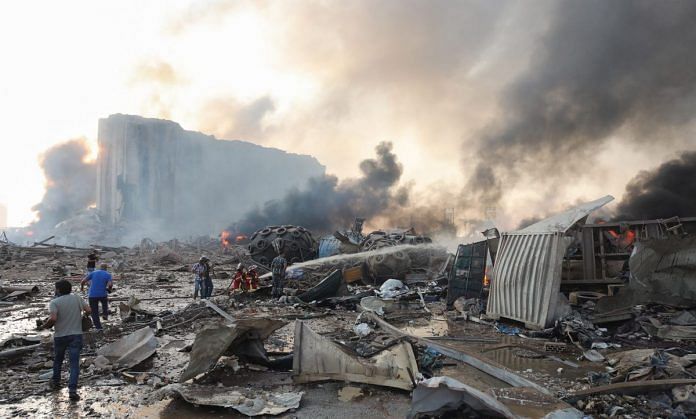New Delhi: The blast that rocked Lebanon’s capital city Beirut Tuesday could be equivalent to almost 240 tonnes of TNT blowing up and was effectively like a small nuclear explosion, said ThePrint’s Editor-in-Chief Shekhar Gupta in episode 542 of ‘Cut the Clutter’.
The explosion, which took place in Beirut’s port, was actually an explosion of ammonium nitrate.
Over 2,700 tonnes of ammonium nitrate had been stored in a godown in Beirut, and while there are many theories about how the blast took place, Gupta said that no one could rule out either mishandling of it as an explosive or deliberate sabotage because Lebanon is a complex and messed-up country.
This is also not the first time an accidental explosion of ammonium nitrate has taken place.
In 1947, an industrial accident in the US state of Texas, where over 2,000 tonnes of ammonium nitrate exploded, killed more than 580 people.
Aside from accidents, the chemical has also been used in terror attacks such as the 2011 Delhi and Mumbai blasts, and the 2013 blast in Hyderabad.
Also read: All about ammonium nitrate — chemical behind the massive blast in Lebanon’s Beirut
How ammonium nitrate reached Beirut
According to a report in The New York Times, a ship was rented by a rich Russian to carry 2,750 tonnes of ammonium nitrate from Georgia to Mozambique, almost seven years ago.
The buyer was reportedly the Central Bank of Mozambique and the proposed use was for industrial explosives. Mozambique is a big mining power.
When the ship reached the Suez Canal, the captain of the ship found that he did not have enough money to cross it.
He then decided to go to Beirut to pick up machinery, which had to be transported to Africa so that he could get paid for transporting it and would also be able to pay the bills at the Suez Canal.
However, the ship was so outdated that the machinery could not be fitted onto the ship and effectively the crew and owners abandoned it. The cargo was confiscated by the Lebanese authorities.
Since Lebanon is such a complex country, no one is willing to buy this story at face value.
A report in Bloomberg notes that some believe that the ammonium nitrate was meant for the Shia terrorist group Hezbollah. The terrorist organisation has used the chemical in the civil war in Syria and even against Israel.
Also read: Lebanon officials ignored warnings on ammonium nitrate behind deadly Beirut blast
Lebanon, the country
Gupta highlighted the complexities that plague Lebanon as a country.
While the country is regarded as the Paris of Asia and is modernised and westernised with a talented population, it has four main glaring problems.
First is the country’s demography, second is its neighbourhood, third is its poor governance and fourth is corruption and the quality of leadership.
According to Gupta, Lebanon follows a confessional system where people of each religious group have a share of power depending on their numbers.
The population comprises of Muslims (54 per cent), Christians (40.4 per cent) and Druze nomads (5.6 per cent) — a nomadic tribe which follows a religion with elements of Islam, Christianity and even Hinduism. Of the 40.4 per cent Christians, 20 per cent are Maronite, 8 per cent are Greek Orthodox and there are other small denominations of Christianity.
In Lebanon, the president is always a Maronite Christian, the prime minister is always a Sunni Muslim, the speaker is a Shia and the deputy speaker and deputy PM are Eastern Orthodox Christians.
However, even though the PM is a Sunni Muslim, he is in power at the sufferance of the Hezbollah, which is Shia, and thereby at the sufferance of the Iranians. The Iranians use the Hezbollah to run their proxy war with Israel and also control Syria.
Thus, the PM doesn’t really have the power to act on his own, which causes further problems.
Aside from political problems, the economy of the country is in grave crisis and the currency is in free fall.
A year back 1.5 lakh Lebanese pounds were equivalent to $750, and today it is equivalent to $75.
And now this explosion will only make things worse as much of what was imported from the country was stored in the port, which has now been destroyed.
Former editor of Hindustan Times Bobby Ghosh said that the global community will also worry about giving money to this Lebanese government given how corrupt they are.




every mushroom cloud has a silver lining if not wait for the rain
Lebanon was once a very prosperous country but religious tensions have always dampened this country’ prospects. From the Lebanese Civil war in 1970s to this day, the tensions are still running high and this political set up is nothing but a shenanigan where leaders really have no power in their hands and are always wary of each others and are more loyal to their religion than their country and infamous groups like Hezbollah could never have said no to this fertile ground for their expansion to advance their vicious acts and rivalry against Israel. The will and aspirations of Lebanese people has been sidelined and there are many actors in the political landscape who are just their for their personal interests.